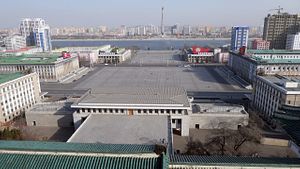South Koreans are quite upbeat about North Korea’s real estate market after several inter-Korean summits that signaled Pyongyang’s will to open itself up more to the world.
People in South Korea, in particular, look to grasp investment opportunities in the real estate market in the North, hoping to take advantage of its expected growth and demands in the future.
As witnessed previously, interest began to grow in areas located around the border with North Korea. South Korea’s Paju city and Yeoncheon county are a good example, as are several Chinese cities, including Dandong. The price of lands and buildings in these cities has soared and real estate agencies and consulting firms are busy with inquiries.
This time, however, the real estate interest stretched further. There are an increasing number of people who are interested not in areas near the border with North Korea but actually inside of it.
Several positive projections on North Korea’s real estate market might have contributed to this.
For one, South Korea’s local media outlets suggest that that the housing market in North Korea is in short supply compared to demand. It is understood that the North needs an additional 23,000 to 24,000 houses per year for the next 20 years. This includes the demand for reconstruction and redevelopment of old houses and also for high-end housing.
Since this is an unexplored area, there are increasing demands among the public in South Korea for professional guidance, and the market is responding. The latest examples are seminars held by the Korea Real Estate Doctor Association. Through regular seminars, the members of the association analyze and discuss topics related to investments in the North Korean real estate market, such as the North’s real estate law and sales trends.
But is it even possible to make investments in North Korea? Isn’t North Korea a communist country where the central government controls everything? Plus, Pyongyang is currently under heavy international sanctions. What do people expect?
Indeed, all land in North Korea is owned by the government. But that does not mean people cannot trade properties, according to Jeong Eun-yi, a researcher at Korea Institute for National Unification.
Accordingly, real estate investment in North Korea is being carried out in the form of trading “rights to borrow” the properties, she said.
Jeong also noted that real estate investments in North Korea are not subject to international sanctions, and, in fact, there has always been interest from Chinese investors in North Korea’s real estate market.
A recent report by the Korea Trade-Investment Promotion Agency (KOTRA) gives a hint of how expensive these Chinese investments in North Korean real estate are. KOTRA’s report shows that the real estate market is rapidly growing in large cities in the North such as Nampo, Kaesong, Chongjin, Sinuiju, Rason, and its capital city Pyongyang.
Sinuiju is one of the most economically developed regions in North Korea, and its housing prices are higher than 5,000 Chinese yuan (about $730) per square meter, which is similar to Dandong city in China.
Although Nampo is a manufacturing base located in the downstream area of the Taedong River and a city adjacent to Pyongyang, its housing prices are relatively high at 3,500 to 6,000 yuan per square meter due to a lack of luxury apartments.
Kaesong is the second largest city after Pyongyang and has similar characteristics to the “special economic zone,” but its housing prices are relatively low at 2,300 to 4,000 yuan per square meter due to sufficient supply.
Too much attention and interest always ends up in speculation. Take a look at this report by Seoul-based online newspaper Daily NK, which carries inside sources’ comments on the recent trends in North Korea’s latest real estate market in Pyongyang.
In the report, a source who is based in North Korea said the overall price of apartments in Pyongyang dropped by 30 percent between July and September. This comes amid increasing supplies of new apartments in Pyongyang, which are often associated with affluent individuals seeking investment returns, the source explained.
“Apart from oversupply, consumer sentiment has been reduced due to heavy sanctions, and the changes North Korea is going through after inter-Korean relations are confusing the people’s economic prospects,” the source added.
If the real estate investment fever fades, the overall negative impact on the North Korean economy will be significant, the source lamented.

































